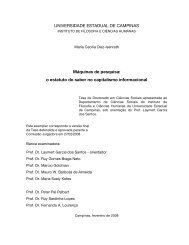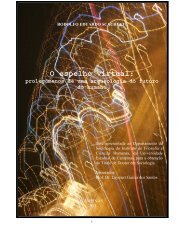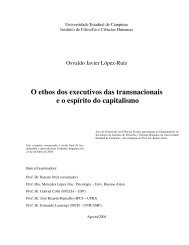As serpentes e o bastão: tecnociência, neoliberalismo e ... - CTeMe
As serpentes e o bastão: tecnociência, neoliberalismo e ... - CTeMe
As serpentes e o bastão: tecnociência, neoliberalismo e ... - CTeMe
You also want an ePaper? Increase the reach of your titles
YUMPU automatically turns print PDFs into web optimized ePapers that Google loves.
sense of change, to help people through it, to seize the massive opportunities for better health and a better quality<br />
of life. And then, with equal vigor, to minimize the threat such developments pose.<br />
The scientists have presented us with that opportunity, but now we, all of us, accept the responsibility to make<br />
these advances work for all our people, in all our countries, for the common good of all humankind.<br />
So, Bill, I believe that this underlines the fact that we do, indeed, as we have often said, together live in a global<br />
community and the importance now of working across national frontiers to safeguard our shared values and put<br />
this remarkable scientific achievement at the service of all human kind.<br />
(APPLAUSE)<br />
CLINTON: Tony, if I could, I would like to pick up on your last remark. I think everybody genuinely is<br />
concerned about the issues you raised, the privacy issues and the whole general set of ethical, social and legal<br />
issues. And it strikes me that our scientists -- the British and the American scientists, our French, German,<br />
Chinese counterparts who worked on this -- were working toward a single, clearly defined goal.<br />
And all those countries and in the other countries of the world that will have to live with both the benefits and<br />
the challenges of these discoveries, there are different legal systems, different social mores, but I think that it<br />
would be a very good thing if the U.S., the UK and anybody else that wants to work with us, could have the<br />
same sort of joint endeavor we've had with the human genome to deal with the implications of this, to deal with<br />
the legal, the social, the ethical implications. We may have differences from country to country, but I think that if<br />
we work together, we give a higher sense of urgency to the project and we'll get a better product.<br />
And so I'm offering you another partnership. It's easy for me to do, because you'll have to do and I'll be gone,<br />
but...<br />
(LAUGHTER)<br />
BLAIR: But, Bill, I entirely agree with that. And I think the fascinating possibilities of this scientific<br />
breakthrough is that it gives us a chance to do so much for our people, but it will raise really difficult ethical and<br />
moral and legal questions. And the decision for us, really, is, as humanity, is whether we are going to engage in<br />
the right cooperation across national frontiers so that we shape our destiny in a way that genuinely does benefit<br />
all our people, that makes the most of the possibilities and faces up to the challenges and dangers that it poses.<br />
And in a way, I think that the scientists that have been involved in this great undertaking have shown the spirit of<br />
cooperation that should now motivate the governments in taking this forward another step.<br />
They have given us this opportunity, but we, all of us, are going to have a common responsibility in using it in<br />
the right way.<br />
So, as we now go to join our separate events on either side of the Atlantic, I think and believe that that spirit of<br />
cooperation, along with the scientific achievement, is something that we can all celebrate.<br />
And I'm once again proud to have taken part in this event with you, Bill. And all the very best to you and all your<br />
team for the work that you've done.<br />
(APPLAUSE)<br />
CLINTON: Thank you.<br />
(APPLAUSE)<br />
Thank you very much, Tony.<br />
Now, in a few moments, we'll hear from Celera president Dr. Craig Venter, who shares in the glory of this day,<br />
and deservedly so, because of his truly visionary pursuit of innovative strategies to sequence the human genome<br />
as rapidly as possible.<br />
And I thank you, Craig, for what you have done to make this day possible. And now I'd like to invite Dr. Francis<br />
Collins to the lectern. I also want to congratulate him. From his development of some of the central methods for<br />
finding human disease genes, to his successful application of those methods, to the discovery of the cystic<br />
fibrosis gene in 1989, to his current leadership for the International Human Genome Project, he has combined<br />
the talents of rigorous science and a profound sensitivity to ethnical, legal and social issues. He's a physicianscientist<br />
of great faith, compassion, energy and integrity.<br />
And he has truly helped us more than anyone else to understand how the marvels of genome science will actually<br />
improve human health.<br />
So Dr. Collins, please come up.<br />
(APPLAUSE)<br />
DR. FRANCIS COLLINS, DIR., NATL. INST. OF HEALTH: Mr. President, distinguished ambassadors, ladies<br />
and gentlemen, it is truly a humble -- humbling and profound experience to be asked to speak here this morning.<br />
First of all, I would like to thank, most sincerely, President Clinton for his remarkable leadership in getting us to<br />
this point. His strong and consistent voice for the importance of innovative science and its responsible uses to<br />
better the human condition has been an inspiration to all of us. He knows that genomics is one of the truly<br />
370





